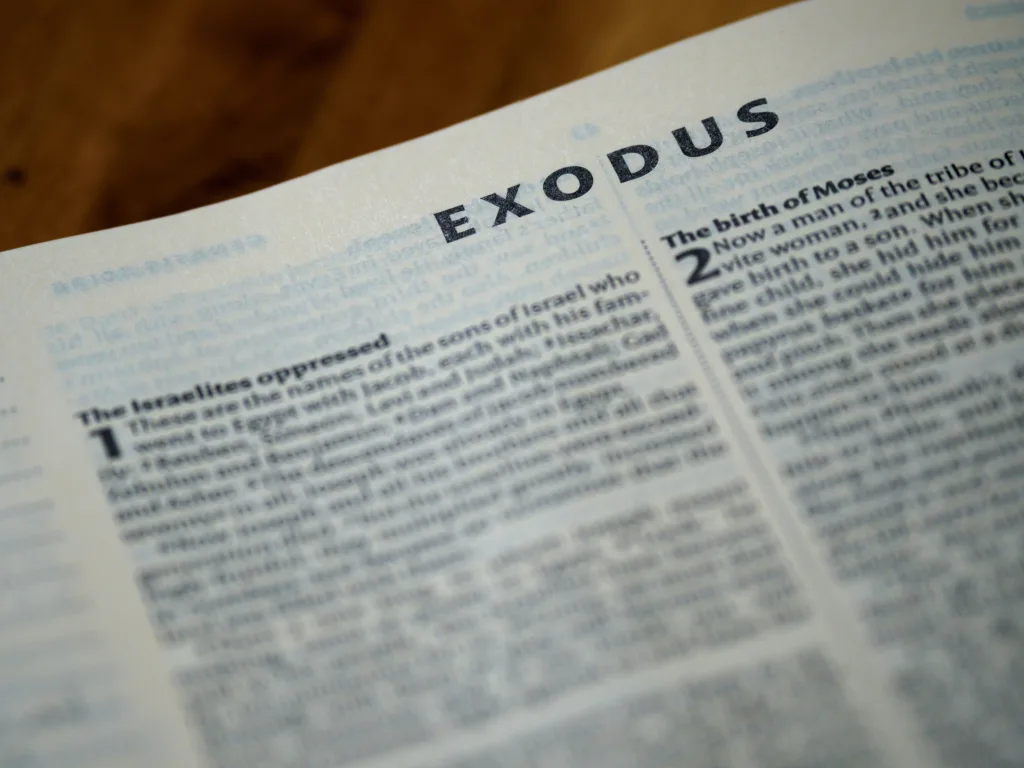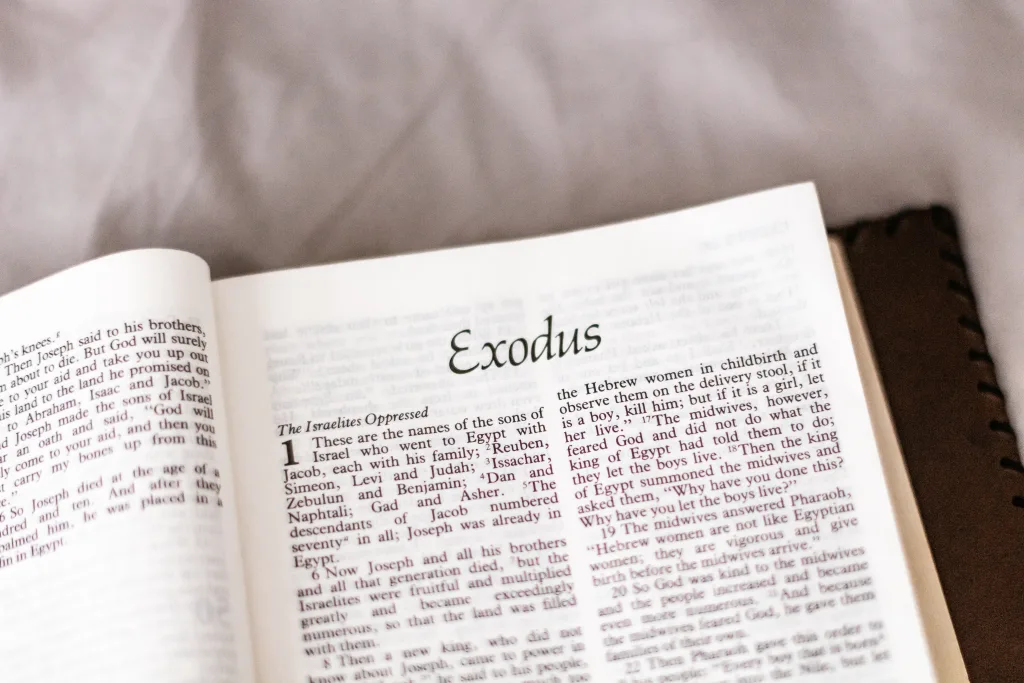The question of when the book of Exodus was written is a complex one, as there are differing opinions among scholars. Traditionally, it has been attributed to Moses, who is believed to have lived in the 13th century BCE. However, modern scholarship tends to place the authorship of Exodus much later, around the 6th and 5th centuries BCE.
The traditional view credits Moses as the author of Exodus, as well as the other four books of the Pentateuch (the first five books of the Bible). According to this perspective, Moses wrote the book based on his own experiences and the divine inspiration he received from God. This would mean that Exodus was written sometime in the 13th century BCE, during or shortly after the events it describes.
However, many scholars today argue that the authorship of Exodus, along with the rest of the Pentateuch, is more complex. They propose that the books were written by multiple authors over several centuries, and then later compiled and edited into their final form. This theory is known as the Documentary Hypothesis.
The Documentary Hypothesis suggests that there are four main sources or documents that make up the Pentateuch: the Yahwist (J), the Elohist (E), the Deuteronomist (D), and the Priestly (P) source. Each of these sources is believed to have been written at different times and reflects different theological and historical perspectives.
According to this hypothesis, the Yahwist source, believed to be the oldest, was composed in the 10th century BCE, while the Priestly source, the latest, was written in the 6th or 5th century BCE. Exodus is thought to contain material from all four sources, with the Yahwist and Elohist sources being particularly prominent.
Supporters of the Documentary Hypothesis argue that the different writing styles, vocabulary, and theological emphases found in Exodus and the rest of the Pentateuch can be attributed to the different sources. They also point to inconsistencies and duplications in the text as evidence of multiple authors.
It is important to note that the Documentary Hypothesis is not universally accepted among scholars, and there are alternative theories and interpretations regarding the authorship of Exodus. Some suggest that the book was written by a single author or a small group of authors during the 6th or 5th century BCE, while others propose different timelines and sources.
The question of when Exodus was written remains a subject of debate among scholars. While traditional views attribute its authorship to Moses in the 13th century BCE, modern scholarship leans towards a later date and the involvement of multiple authors and sources. The exact dating and authorship of Exodus may never be definitively determined, but the ongoing study and analysis of the text provide valuable insights into the ancient world and the development of religious and literary traditions.
When Was Genesis And Exodus Written?
Genesis and Exodus are two books found in the Old Testament of the Bible. The traditional belief is that these books were authored by Moses, who is considered a central figure in the Hebrew Bible. According to this belief, Moses would have written these books during the 15th and 13th centuries BC.
However, modern scholarship has challenged this traditional view and suggests that Genesis and Exodus were likely written much later than the time of Moses. Many scholars, particularly those from the 19th century onward, propose that these books were compiled and edited during the 6th and 5th centuries BC, which is several hundred years after the presumed lifetime of Moses.
Here is a breakdown of the scholarly perspective on the dating of Genesis and Exodus:
Genesis: It is believed that the book of Genesis was composed over a period of time, incorporating various oral and written traditions. The earliest sources are thought to date back to the 10th century BC, while the final compilation of the book may have occurred in the 5th century BC.
Exodus: Similarly, the book of Exodus is believed to have been composed through a process of redaction, incorporating different sources and traditions. Some of these sources may have originated in the 10th and 9th centuries BC, while the final editing and compilation likely took place in the 6th and 5th centuries BC.
It is important to note that these dating proposals are based on textual analysis, linguistic studies, and comparisons with other ancient Near Eastern texts. As with any historical research, the dating of biblical texts is subject to debate and ongoing scholarship.
While tradition attributes the authorship of Genesis and Exodus to Moses, modern scholars suggest that these books were likely written or compiled during the 6th and 5th centuries BC, long after Moses is believed to have lived.

What Time Period Is Exodus?
Exodus is a historical event and a book in the Old Testament of the Bible. It is generally believed to have taken place in the 13th century BCE. The event of Exodus refers to the liberation of the Israelite people from slavery in Egypt, led by their prophet and leader, Moses. The book of Exodus, which is the second book of the Bible, provides a detailed account of this event and the subsequent journey of the Israelites through the wilderness towards the Promised Land.
Who Wrote Exodus And To Whom Was It Written?
Exodus, one of the books in the Bible, is traditionally attributed to Moses as its author. Moses is believed to have written the book during the time Israelites were wandering in the wilderness after their escape from Egypt.
Exodus was written primarily for the Israelites, the descendants of Abraham, Isaac, and Jacob, who were enslaved in Egypt. The book serves as a historical account of their liberation from bondage and the establishment of their covenant with God. It contains the story of Moses leading the Israelites out of Egypt, the crossing of the Red Sea, the giving of the Ten Commandments, and the construction of the Tabernacle, among other significant events.
The purpose of Exodus was to provide the Israelites with a foundation for their identity as a chosen people and to instruct them on how to worship and live according to God’s laws. It also served as a reminder of God’s faithfulness and the importance of following Him.
In addition to the Israelites, Exodus was also intended to be read by future generations of Israelites, preserving their history and faith. The book contains instructions, laws, and rituals that were to be passed down from generation to generation.
Exodus was written by Moses and primarily intended for the Israelite community, both the contemporary generation and future ones, as a historical and instructional account of their liberation from Egypt and their covenant with God.
What Is The Oldest Book In The Bible?
The oldest book in the Bible is believed to be the Book of Job. It is a profound and poetic account that explores the problem of human suffering and the nature of God’s justice. The book is estimated to have been written around the 6th century BCE, making it one of the earliest works in the Hebrew Bible.
Here are some key points about the Book of Job:
– Authorship: The author of the Book of Job is unknown, but it is attributed to an ancient Hebrew sage or prophet.
– Setting: The story of Job takes place in the land of Uz, which is thought to be located in the region of modern-day Jordan or possibly southern Israel.
– Theme: The central theme of the book is the question of why good people suffer. It explores the concept of human suffering and raises philosophical and theological questions about the nature of God and the existence of evil.
– Structure: The book is divided into three main sections: the prologue, the dialogue between Job and his friends, and the poetic speeches of God at the end. Each section contributes to the overall exploration of the book’s theme.
– Characters: The main character, Job, is a righteous and prosperous man who faces immense suffering and loss. His friends attempt to offer explanations for his suffering, but their arguments are ultimately challenged by Job. God’s speeches towards the end of the book provide a powerful conclusion to the narrative.
– Literary Style: The Book of Job is renowned for its poetic and philosophical nature. It contains vivid descriptions, dialogues, and speeches that showcase the depth of human emotion and the complexities of theological reflection.
– Influence: The Book of Job has had a significant impact on religious and philosophical thought throughout history. Its exploration of suffering, justice, and the nature of God continues to be relevant and thought-provoking for readers today.
The oldest book in the Bible is the Book of Job, believed to have been written around the 6th century BCE. Its profound exploration of human suffering and the nature of God’s justice has made it a timeless and influential piece of literature.

Conclusion
The question of when the book of Exodus was written remains a subject of debate among scholars. While tradition credits Moses as the author, modern scholarship suggests that the book was likely written in the 6th and 5th centuries BCE, several hundred years after Moses is believed to have lived. This shift in perspective is based on linguistic and historical analysis, as well as the discovery of similar narratives and themes in other ancient Near Eastern texts from that time period. Despite the uncertainty surrounding its authorship, the book of Exodus continues to hold significant religious and cultural importance, recounting the liberation of the Israelites from slavery in Egypt and the establishment of their covenant with God.
